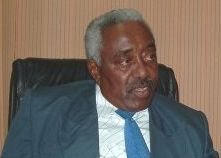Sudan says US-Britain draft UN resolution is misleading
Aug 20, 2006 (KHARTOUM) — Sudan’s justice minister on Sunday denounced a U.S.-British draft U.N. resolution that would transfer peacekeeping in Sudan’s conflict-ravaged Darfur region from the African Union to a U.N. force, calling it “wicked” and “misleading.”
 Justice Minister Mohamed Ali al Mardhi also warned that the government would not protect international forces against attacks from the Sudanese people and individuals from neighboring countries.
Justice Minister Mohamed Ali al Mardhi also warned that the government would not protect international forces against attacks from the Sudanese people and individuals from neighboring countries.
The “draft resolution that will be presented to the U.N. Security Council is full of wicked and misleading elements,” al Mardhi told reporters.
The financially strapped African Union has requested to hand over peacekeeping to a more robust U.N. mission, but Sudanese President Omar al-Bashir is opposed and has warned that Sudan’s army would fight any U.N. forces sent to Darfur.
Britain’s U.N. ambassador has stressed that no U.N. force will deploy in Darfur without the consent of the government, but the United States’ deputy ambassador has said the Sudanese government’s consent is not required by the resolution.
Al Mardhi said the resolution ignores the Sudanese government.
It “discusses the issue of deploying international forces as if there is no government in the country,” he said.
Britain and the United States introduced the draft resolution last week at a closed Security Council meeting following a briefing by Assistant Secretary-General for Peacekeeping Hedi Annabi, who told members that the security situation in Darfur had worsened since late June.
The resolution would replace the 7,000-strong African Union force with a U.N. peacekeeping mission of about 22,600 .
The conflict in Darfur began when ethnic African tribes revolted against the Arab-led Khartoum government in early 2003. Arab militiamen responded with a wave of attacks. Over 200,000 civilians have died, and more than 2 million have fled their homes.
A May peace agreement signed by the government and one major rebel group was supposed to help end the conflict in Darfur. Instead, fighting between rival rebel factions has intensified.
(AP/ST)
